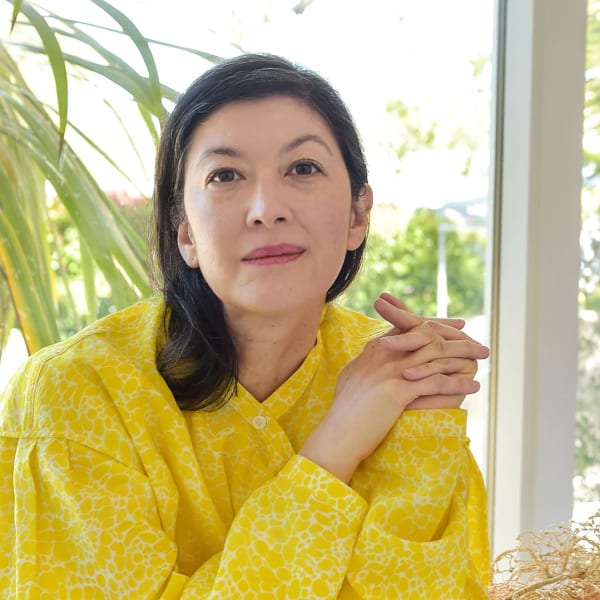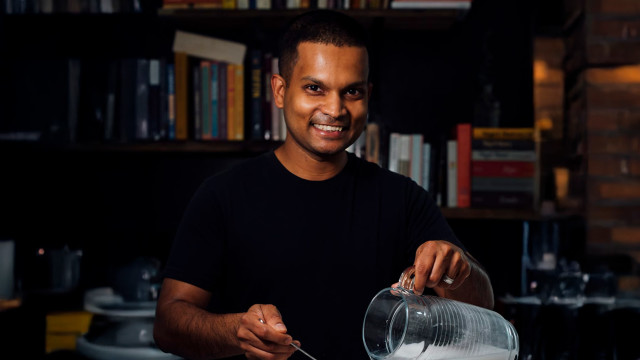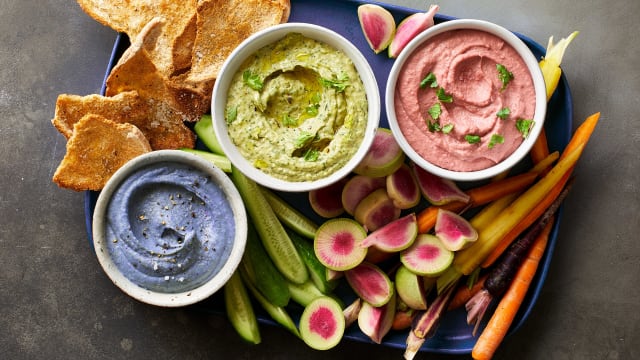Q&A with Hawa Hassan

Born in Mogadishu and raised in Seattle, Hawa Hassan is a chef, cookbook author, cooking show host, and the founder of Basbaas Foods — a line of African-inspired sauces and condiments. Hawa tells the story of a refugee experience through her food: a family forced out of Somalia by civil war, growing up away from her parents and siblings, and then reconnecting with them years later. Ultimately, through cooking and storytelling, she’s a community builder.
Her cookbook, In Bibi’s Kitchen: The Recipes & Stories of Grandmother from Eight African Countries That Touch the Indian Ocean, shares an intimate look at the cuisines of Eritrea, Mozambique, South Africa, Madagascar, Comoros, Tanzania, Kenya, and her native Somalia. “There’s a thread between people and the book that says, ‘I see myself here,’” Hawa said.
She’s currently working on her next book, set to be published in fall 2023, which is about civil war and food. “What did that look like for people from Lebanon, Congo, Liberia? What did civil war look like in El Salvador? What I’m finding out more and more and I think I know this just from my end: People don’t really have a deep connection to the war, they have a connection to the outcome. I think what I want to convey in this book is how people live every day. Their biggest concerns are, how are my kids going to get to school, I gotta get up in the morning and go to work, what are we going to have for dinner tonight. I’ve written all the recipes myself. But what I’m collecting from them is, what do you want people to know about your country? It’s more of a joyous book.”
RG Food: How do you incorporate wellness into your daily food practice?
Hawa: I eat for the time of my life I’m in. I eat seasonally. When I’m in winter, I eat heavier things. When I’m in summer, I eat lighter things. And then there are periods in a season when I’m in deep mourning for one reason or another, whether it’s mourning my childhood or mourning a time in my life that’s gone. Then I eat more traditional foods from home. So I eat a lot of familiar flavors from my childhood that really bring me back to the start of who I am. So that could be a warmer spice like cardamom, cumin, turmeric, cinnamon.
This morning, I made a tea that is traditional to my culture for tension releasing, bloating, all of these different things. Cardamom, cumin, and fennel seeds in hot water. I eat traditionally, I eat seasonally, I eat for my mood. Food is a huge aid in my life because it helps me move through those times.
RG Food: What are some other traditional dishes you might make for yourself?
Hawa: If it’s a Sunday and I’m missing home or missing my childhood, I might make an anjero, which is a Somali dish that we eat for breakfast made with just a few ingredients and it’s fermented. I’ll make that, I’ll put some ghee butter on it and a little bit of brown sugar and have it with some rooibos tea and immediately I’m transported to a time in my life that I felt either really safe or was in the company of an older person in my family, so I make that often.
I also make a lot of stews. I do that depending on what the season is. I make a lot of pasta sauces from home. Many of these things, the main components are the spices that go into it, which are very reflective of the Indian Ocean. I make a Somali sugo and the main difference being that it’s packed with cardamom, cumin, cardamom, cinnamon, turmeric, black peppercorn, a dash of salt. Just warmer spices, a lot more aromatic than a regular pasta sauce.
RG Food: What’s one nourishing dish that you would encourage the whole world to make?
Hawa: Shiro, which is ground chickpeas. It hails from east Africa, in places like Eritrea, Ethiopia. You could scoop it up with anything, scoop it up with a piece of bread, scoop it up with an anjero, scoop it up with a pita. Or you could just eat it with a spoon. It’s packed with nutrition, packed with protein but it’s not meat. It’s something everyone could eat.
RG Food: What’s your favorite season to cook in?
Hawa: I want to say summer. But that’s not true. I enjoy other people’s cooking in the summer. In summer I gather with other people and I’m outside a lot. Probably fall. I love puréed soup in the fall. I have a thing for butternut squash in the fall. I love pumpkin seeds in the fall.
RG Food: What is an ingredient you would like to see more people cook with?
Hawa: It would be nice to see more people use lime as a brightener. A lot of people don’t think of lime as a flavoring agent. Which is so basic, I know. The other I’d say is cilantro. There are a lot of people in the U.S. who genetically, when they taste cilantro, they say that it tastes like soap. But I think cilantro is an incredible herb that is so versatile. So my two answers would be lime to brighten your food and cilantro to seep into the flavors already there and enhance them as well.
RG Food: Can you tell us how you manage your cravings?
Hawa: I would say keep it simple. If there’s a portion of a dish that you love that isn’t healthy, figure out a way to extract that flavor to add to a dish that you intend to be healthy. If I want to have a glazed doughnut, I always think about, how can I get that same taste — what I’m going for is sweetness. How can I get that without the carb part of it? So then I always go to a fat. I tell myself this all the time, when you’re craving a thing, what you really want is this. So I might have a tablespoon of almond butter. That for me is keeping it simple. If I’m craving a doughnut, I might have two dates with a teaspoon of almond butter and just a dab of sea salt. Now I’ve gotten all of that. It’s just reimagining the thing that you want and figuring out a way for yourself. Where’s that craving leading you and how can you simplify that craving for yourself?
I think that so many of us believe to eat healthy is so much more work than not. You know how hard it is to go out of your way to go get that thing that isn’t good for you?
RG Food: Do you have any nutrition concerns, and if so, how do you address your main concern?
Hawa: The one thing that I’m always concerned about is if I’m getting enough fiber. You might have to do the research on the number, but a large number of Americans don’t get enough fiber in their daily diet. I’m always thinking about how to get more flax seed in my diet. That is a concern of mine daily. So I make a smoothie every day.
RG Food: What’s in your smoothie?
Hawa: I use a couple handfuls of spinach, maybe two cups of spinach. A half or whole banana, a heaping tablespoon of flax seed, a tablespoon of coconut oil, a half a glass of macadamia milk, and water. If I’m feeling especially frisky, I’ll put in two dates.
RG Food: What’s something you make a point of doing before you sit down at the table?
Hawa: If I’m having people over, we always bless the food. It doesn’t matter where you come from or who you are. You don’t have to be religious to give a word of a blessing to a meal. So in my home we always bless the food. If it’s just me and I’m cooking for my partner, I make sure the intention I’m cooking with comes out in the food. So I try to be in a calming, loving state of mind. I don’t cook if I’m upset.
RG Food: Do you find cooking meditative?
Hawa: I think chopping is really meditative. I also think dishwashing is really meditative. A lot of people would disagree with me, but I love it. Maybe it’s the immigrant oldest daughter in me.
Key Takeaways
- The chef on the benefits of fiber in daily meals.
- Deal with cravings with healthy substitutes.
- Cook with seasonal produce and intention.





